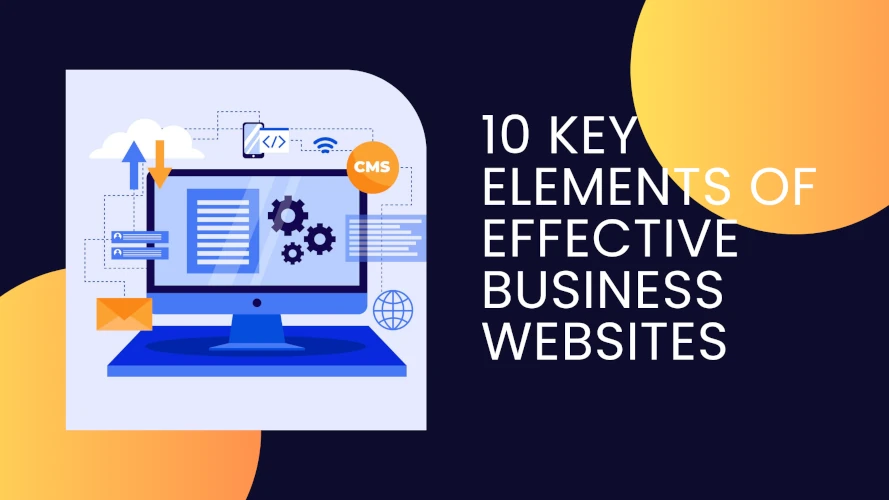Does your business need a website to succeed? While every business is unique, a website is crucial for reaching customers, establishing credibility, and staying competitive in today’s digital world. When prioritizing website development, focus to build an effective website. This entails recognizing the significance of a well-designed, user-friendly website that acts as your online storefront, showcasing your products or services and providing valuable information to potential customers.
So, how can you build an effective business website? The Devstein LLC, a professional website development agency with an experienced team has compiled a list of the top 10 website development and marketing principles that will give your business a significant edge over the competition.
1. Choose the Right Domain Name:
Before you even start the website development process, there’s an important decision to make:
Your domain name is your online identity. It should be memorable, relevant to your business, and easy to spell. Aim for a concise, one-word domain if possible. This makes it easier for customers to find and remember your website.
2. Building an Effective Business Website: Choose a Reliable CMS:
If you are a small business owner, you don’t need to custom build a content management system for your website. You can build your website using a dependable, well tested and easy to manage content management system.
A content management system (CMS) like WordPress simplifies website management. It allows you to easily update content, add products, and manage images without any coding knowledge. WordPress is widely used and trusted, making it an excellent choice. There are other content management systems like Joomla, Drupal, Magento etc.
Using a reputable CMS reduces your need to code everything, and helps you to keep your content, and products updated while saving your hours of work.
3. Optimize Your Code:
Clean, SEO-friendly code is essential for a high-performing website. Proper HTML structure and coding practices enhance search engine visibility, improve user experience, and boost your website’s ranking. Avoid common mistakes like excessive JavaScript that can slow down your site and hurt its performance. Use proper meta tags and alt texts of your images.
4. Mobile Optimization: A Cornerstone to Build an Effective Business Website:
In today’s mobile-first world, a mobile-responsive design is non-negotiable. The majority of internet users access websites from their smartphones. If your website isn’t easily navigable on mobile devices, you risk losing customers to competitors with better mobile experiences. A mobile responsive website delivers a seamless experience to the intended users and reduces the bounce rate significantly. You must pay attention to your audience coming from mobile while working on your website design and development.
5. Provide Clear Contact Information:
Especially when your goal is to generate leads through your website, or if your business model requires frequent customer interaction, it is crucial to simplify the communication process and make it effortless for customers to get in touch. Include your phone number, email, and business address prominently on your website Header and footer. Use click-to-call and contact forms for easy communication. Do not forget to link to your social media profiles as well.
6. Focus on Quality Content:
The content on your website is your chance to showcase your expertise and engage with customers. Write clear, informative, and compelling copy that addresses your target audience’s needs. Include relevant keywords but prioritize substance over sheer volume.
7. Build Trust with Professional Design:
A well-designed website inspires confidence in potential customers. Use a clean, professional layout with intuitive navigation. Include trust signals like SSL implementation, customer testimonials, security badges, and awards to strengthen your credibility.
8. Optimize for User Experience:
User experience (UX) is key to keeping visitors on your site and encouraging them to take action. Ensure your website is fast-loading, easy to navigate, and provides a seamless experience across devices. Pay attention to details like readable font sizes, logical site structure, and clear calls to action where required.
9. Adopt SEO Best Practices:
Don’t let your website get lost in the crowd. Implement sound SEO strategies, including keyword research, meta-tag optimization, and quality backlink building. Make sure search engines can easily crawl and index your site. Hiring a professional SEO agency like Devstein LLC can be a smart investment if SEO isn’t your expertise.
10. Treat Your Website as a Living Asset:
A website is never truly “done.” Regularly review and update your content, design, and technical elements to keep your site fresh, relevant, and performing at its best. Stay informed about the latest web trends and best practices to continuously improve your online presence.
By following these principles, you’ll create a powerful online platform that not only represents your business well but also attracts and converts customers. Your website will become a valuable asset that drives growth and success for your business.
So, are you ready to build an effective business website that outperforms the competition? Let’s get started! Contact Devstein LLC, a professional website development agency! today to schedule a consultation and learn how we can help you create a website that delivers results.









One thought on “10 Key Elements to Build an Effective Business Website”
Comments are closed.